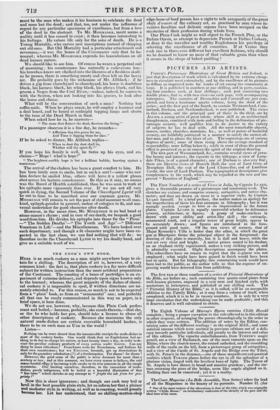THE COOK'S OWN' BOOK.
HERE is as much cookery as a man might anywhere hope to ob- tain for a shilling. The description of art is, however, of a very common kind : the fact is, that plain cookery is a far more difficult subject for written instruction than the more artificial preparations of the Continent. The roasting of a brace of partridges is an ex- periment of extreme delicacy, and depends upon signs known only to the learned; whereas the great majority of the dishes of chemi- cal cookery it is impossible to spoil, if written directions are mi- nutely attended to. For this reason, so much is not to be expected from a "plain" book, as from an "ornamental" one; and probably all that can be easily communicated in this way on paper, in a brief space, is here done.
We do not see, however, why, because this Plain Cook prefers roast and boiled,—because, probably, she excels therein,—that she, or the he who holds her pen, should take a licence to abuse all other descriptions of cookery. Because she maintains the only natural made-dishes are certain execrable household hashes, is there to be no such man as UDE in the world ?
Listen— Nothing can be more absurd than the innumerable receipts for made-dishes in most of the cookery books. One would think that an Englishman had no- thing to do but to change his nature, at least twenty times a day, in order to de- vour the peculiar culinary products of every nation under heaven. Can any thing be more ridiculous? Frenchmen write for Frenchmen, and Italians for their own countrymen ; but WE ENor.isit, forsooth, get up dissertations fit only for the gustatory cohobation (?) of a Sardanapalus. For shame! for shame ! However, the good sense of the public is never dormant for more than a century or two; and at this moment, we have every reason to believe, the said many-headed effigy is becoming wide awake to its true interests in all the simple economies. Our limiting ourselves, therefore, to the concoction of made- dishes, purely indigenous, will be hailed as a beautiful illustration of that 4' fine taste" which shrinks at any attempt to "fright the isle from her pro- prietyl" Now this is sheer ignorance; and though our cook may boil or brad in the best possible plain style, let us inform her that a plainer and modester style in writing, as well as in roasting, would greatly become her. Let her understand, that no shilling-mutton-chop edge-bone-of-beef person has a right to talk arrogantly of the great chefs dteuvre of the culinary art, as practised by men whose in- ventive faculties and delicate organs have been occupied on the mysteries of their profession during whole lives. Our Plain Cook might as well object to the French Play, or the Italian Opera, as attempt to depreciate French or Italian Cookery, or deny to the traveller and wealthy Englishman his privilege of selecting the excellences of all countries. If at Venice they cook rice in threescore different but excellent fashions, why should we be doomed to know no more of that valuable grain than when it occurs in the shape of baked pudding ?


























 Previous page
Previous page